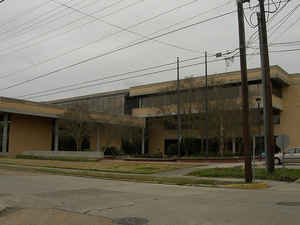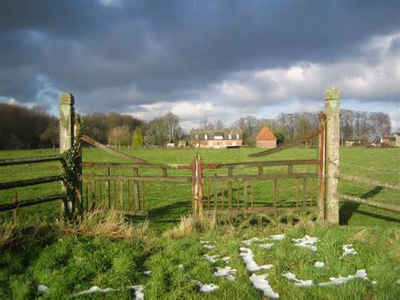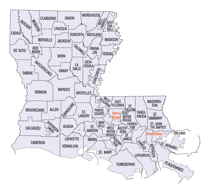Louisiana Parishes
Louisiana is divided into sixty-four parishes. On March 31, 1807, the territorial legislature divided the state into 19 parishes, without getting rid of the old counties (which continued to exist until 1845). In 1811, a constitutional convention organized the state into seven judicial districts, each consisting of groups of parishes. In 1816, the first official map of the state used the term, as did the 1845 constitution. Since then, the official term has been parishes.Iberville Parish, Louisiana
Iberville Parish Education, Geography, and History
Iberville Parish is a parish located
south of Baton Rouge in the state of Louisiana. Based on the 2010 census,
the population was 33,387. The parish was formed
in 1807. The parish seat is Plaquemine.
Iberville Parish is named in honor of an explorer named Pierre
Le Moyne d'Iberville, the brother of Jean-Baptiste Le Moyne de Bienville.
Iberville Parish is part of the Baton Rouge, LA Metropolitan Statistical Area.
Etymology - Origin of Iberville Parish Name
The parish was named in honor of an explorer named Pierre Le Moyne d'Iberville, the brother of Jean-Baptiste Le Moyne de Bienville
Demographics:
County QuickFacts: CensusBureau Quick Facts
Iberville County History
Iberville Parish was created on 1807, from Assumption and Ascension Parishes
and the parish was named in honor of an explorer named Pierre Le Moyne d'Iberville,
the brother of Jean-Baptiste Le Moyne de Bienville. The Parish seat is Plaquemine
Iberville was "discovered" by French explorer Pierre LeMoyne, Sieur
d'Iberville in 1699, but its rich delta soil and many waterways had been discovered
by Indian tribes long before Iberville ever set foot here. While it was initially
an agricultural area, Iberville has changed through the centuries to accommodate
the changing times. The parish has always had plenty of sugarcane and soybean
fields, but through the years the hardwood timber industry, river commerce
and now industrial development have been essential to a thriving parish economy.
From the 1800s until the mid-1900s, Louisiana produced more sugar than any
other state in the nation, and Iberville, as the state's leading sugarcane
producer, drew the name "Sweet Iberville."By the late 1800s Bayou
Plaquemine, running through the heart of Iberville, became the most common
route from the Mississippi River into the interior of Louisiana, and this
water traffic brought a boom in the parish's timber and sawmill industries
and a variety of commercial establishments catering to travelers. It also
resulted in the construction of the historic Plaquemine Lock.
With the agricultural, timber, sawmill, and water commerce industries powering
the economy, Iberville prospered into the 1960s, when the Lock was finally
closed, replaced by a bigger structure closer to Baton Rouge. But by this
time the chemical industry had realized the many advantages that Iberville
offered with its access to the Mississippi River, interstate travel, electrical
power and hard-working people. Today, the chemical and agriculture industries
power the economy, and exist in harmony with the tourism industry.
The parish now has six municipalities - Plaquemine, the largest city and capital
of the parish, St. Gabriel, White Castle, Rosedale, Grosse Tete and Maringouin.
It is experiencing an economic burst, with several chemical and industrial
plants announcing new plant start-ups and expansions totaling well over $1
billion. A parish rich in history, Iberville is also a parish moving into
a new and dynamic chapter of its long life.
Geography: Land and Water
As reported by the Census Bureau, the parish has a total area of 653 square miles (1,690 km2), of which 619 square miles (1,600 km2) is land and 34 square miles (88 km2) (5.2%) is water.
Iberville Parish is located close to the center of Louisiana. Part of the Atchafalaya National Wildlife Refuge is located in this parish.
Neighboring Parishes
Bordering parishes and counties are as follows:
- North: West Baton Rouge Parish
- Northeast: East Baton Rouge Parish
- East: Ascension Parish
- Southeast: Assumption Parish
- Southwest: Iberia Parish; St. Martin Parish
- Northwest: Pointe Coupee Parish
Education
Iberville Parish School Board operates the public schools within Iberville Parish.







